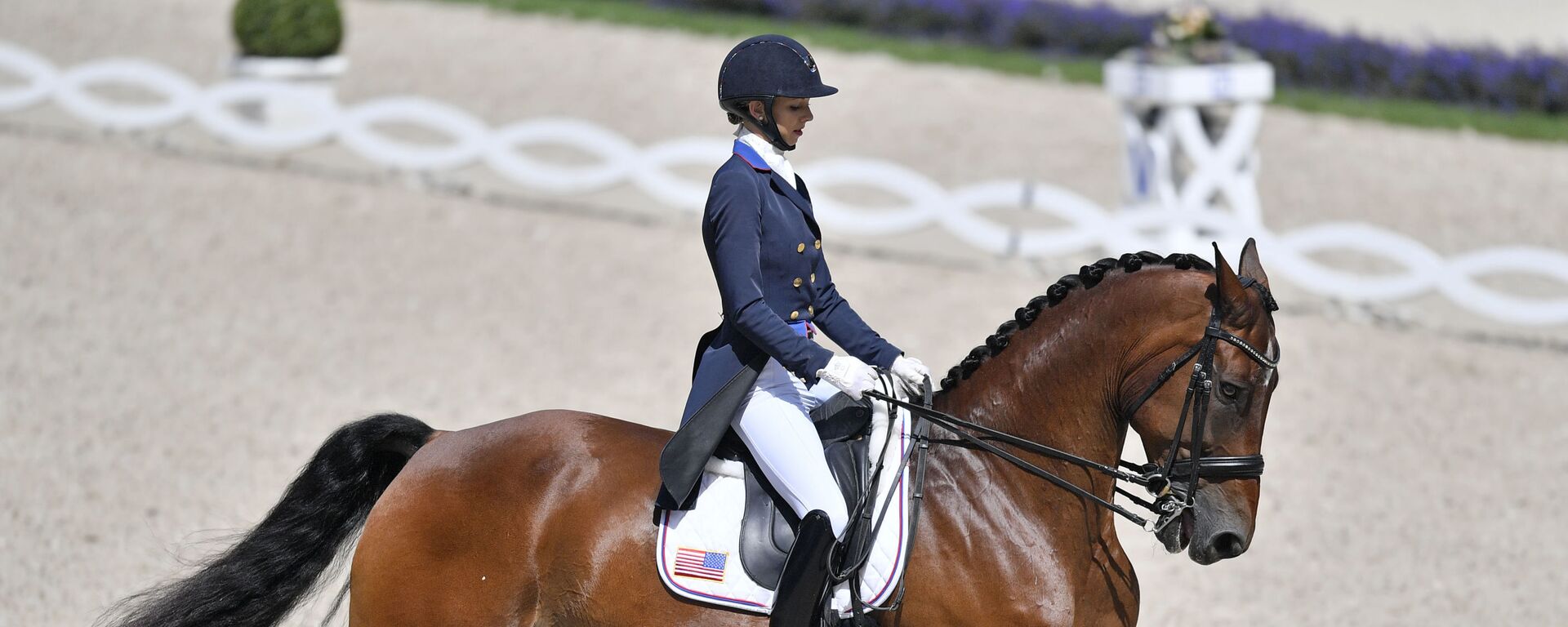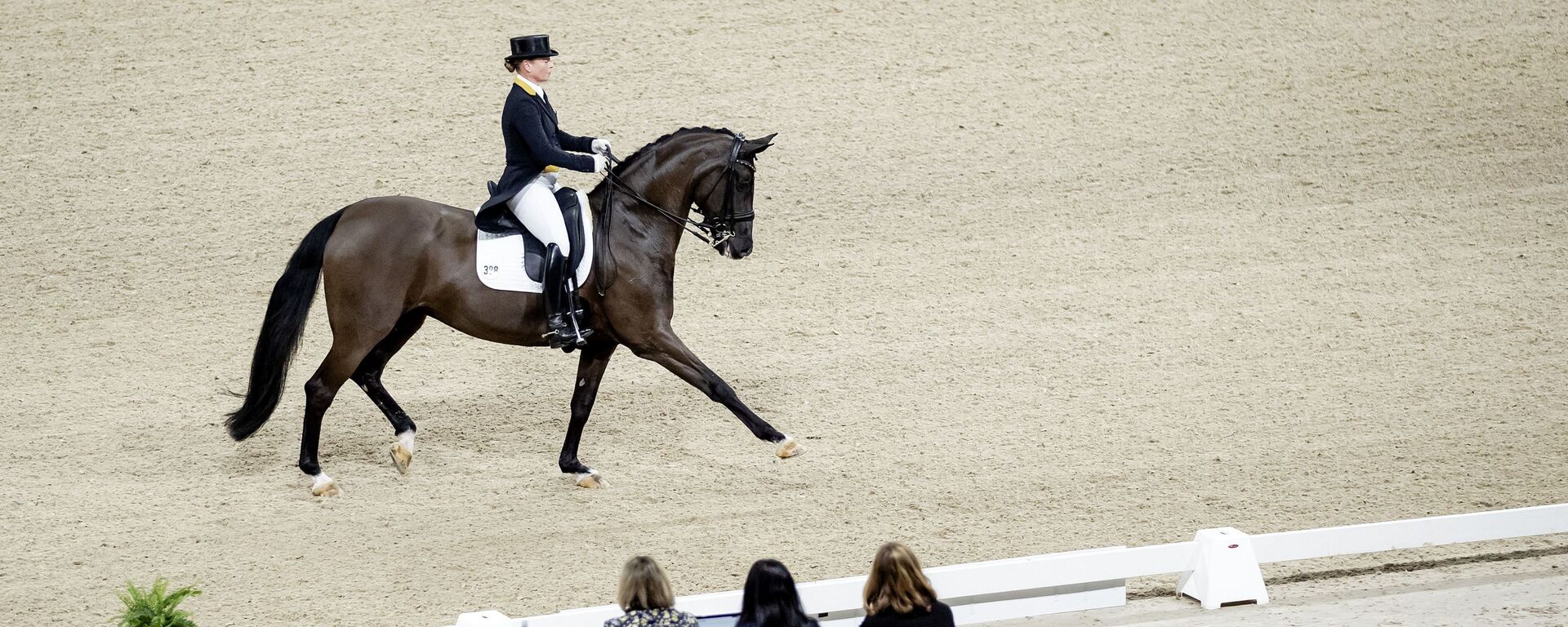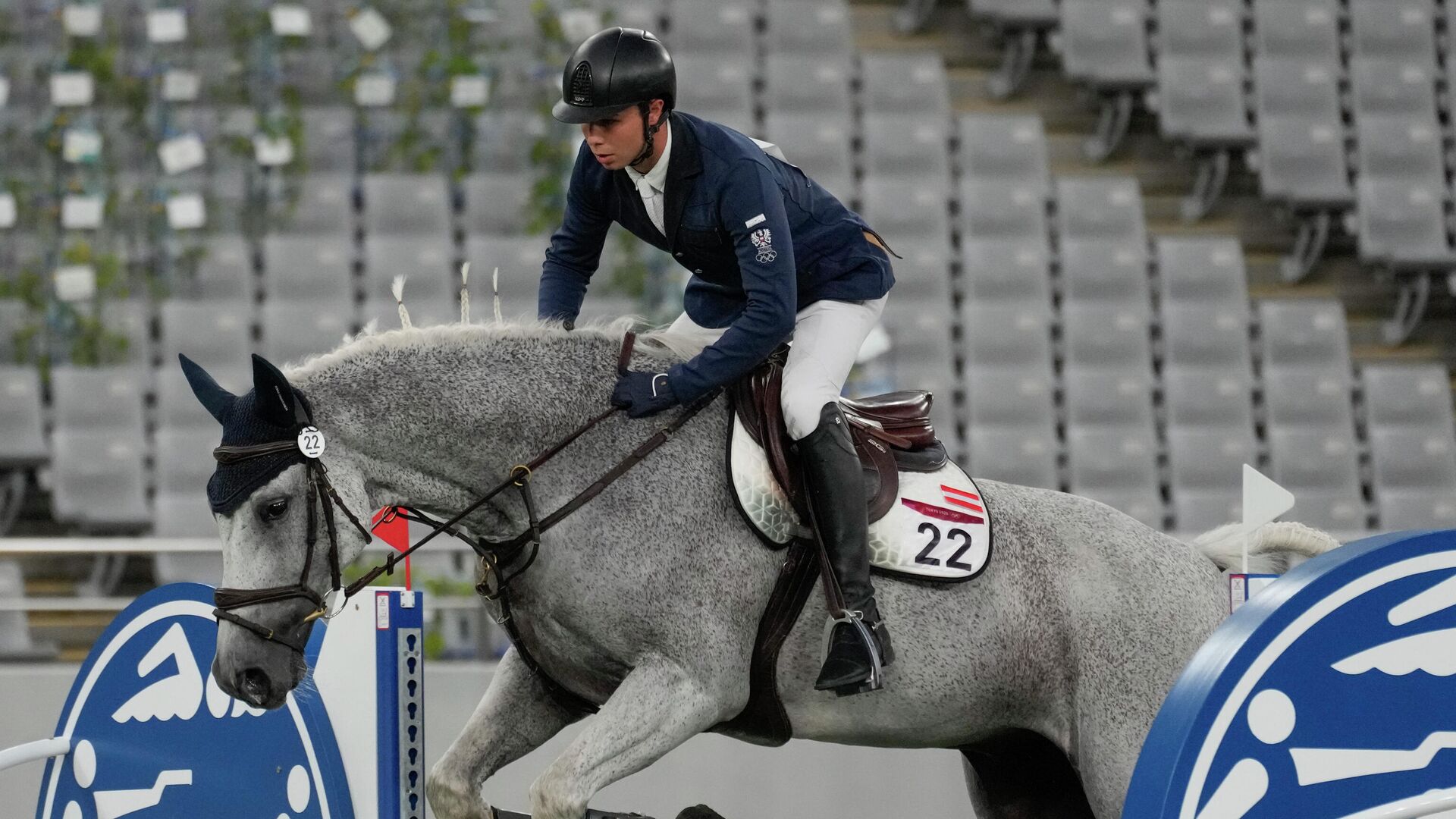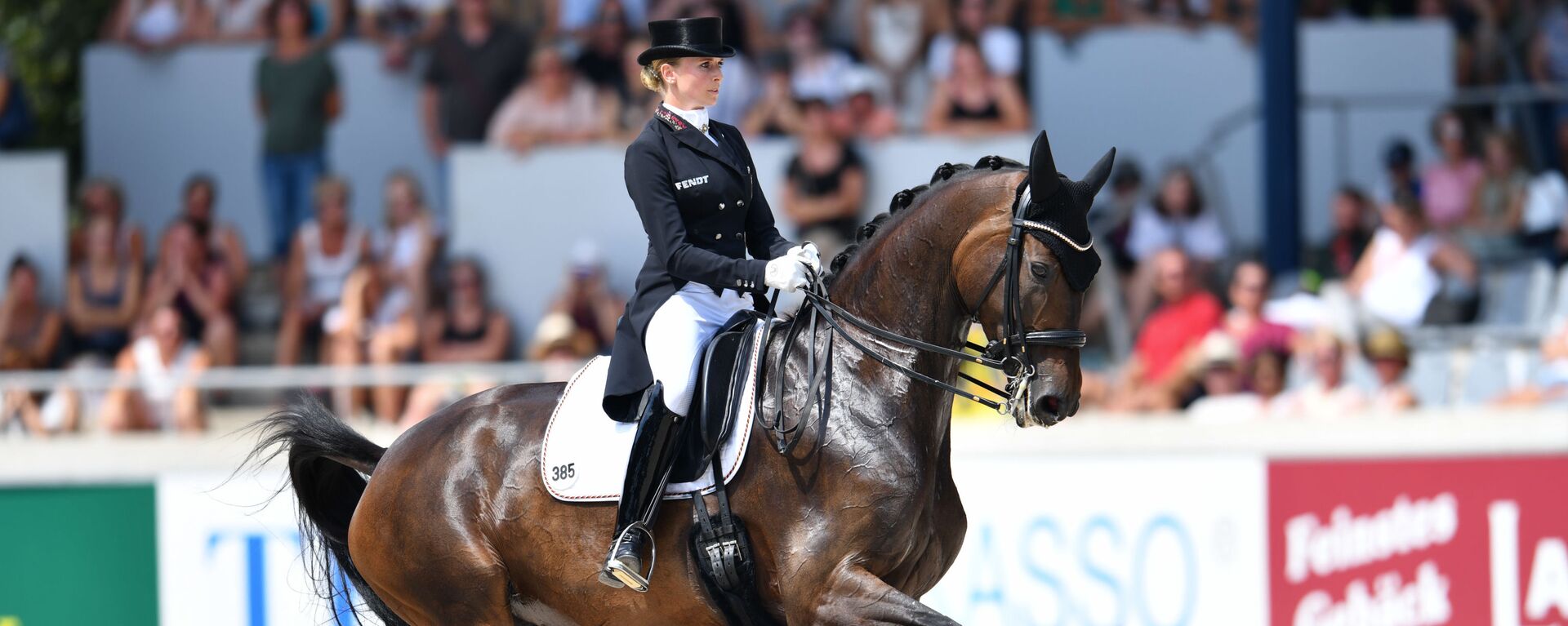https://sputnikglobe.com/20211105/modern-pentathlon-drops-riding-how-saint-boys-rebellion-turned-spotlight-on-horse-abuse-1090505937.html
Modern Pentathlon Drops Riding: How Saint Boy's Rebellion Turned Spotlight on Horse Abuse
Modern Pentathlon Drops Riding: How Saint Boy's Rebellion Turned Spotlight on Horse Abuse
Sputnik International
The Union Internationale de Pentathlon Moderne (UIPM), a member of the International Olympic Committee (IOC), announced on 4 November that it had opened a... 05.11.2021, Sputnik International
2021-11-05T15:49+0000
2021-11-05T15:49+0000
2021-11-05T15:49+0000
animal abuse
world
europe
asia
opinion
animal cruelty
horse
equestrian
pentathlon
2020 tokyo olympics
https://cdn1.img.sputnikglobe.com/img/07e5/0b/05/1090505583_0:0:3071:1728_1920x0_80_0_0_5301fcaf96cdc01d5a6b506ae11c3db1.jpg
A few days ahead of the UIPM's official announcement, The Guardian reported that the entity had secretly voted to remove horse riding from in its Olympic programme after the Paris 2024 Games.Horse riding has been a core sport on the Olympic programme for 109 years, along with fencing, freestyle swimming, pistol shooting, and cross country running. However, an ugly scene of German trainer Kim Raisner punching a horse named Saint Boy, ridden by athlete Annika Schleu during the Tokyo Olympics, has reportedly become the final straw.Raisner was disqualified from the remainder of the Olympic Games after she struck the horse and encouraged Schleu to do the same. In September, the UIPM Disciplinary Panel found the German coach guilty of violating the competition rules.Animal Cruelty: Rollkur/LDRThe horse abuse problem remains acute despite animal rights groups vigorously beating the drum for solving this issue for quite a while, says Hector Carmona Jr, a horse trainer and clinician who was a member of the International Federation for Equestrian Sports (FEI) up until the mid-1990s as a competitor.The UIPM had no alternative but to react to the growing evidence of animal cruelty at equestrian contests, according to the trainer. Carmona believes that the FEI may now finds itself in a heap of trouble, since horses were also repeatedly mistreated during the FEI European Championships, the Concours Hippique International Officiel (CHIO) Aachen and the World Championships for Young Dressage Horses.One of the problems is that although the FEI banned the usage of the so-called Rollkur technique in 2010, it has been used since then nevertheless, Carmona highlights. This technique involves forcefully pulling the horse’s neck round in a deep curve so its nose almost touches its chest. A method of training referred to as "Long, Deep and Round" (LDR), which has not been prohibited by the FEI, is a euphemism for Rollkur, highlights the trainer. These tough techniques are used to gain quick submission and domination of an animal instead of spending time and effort to build trust and harmonious connection between a rider and a horse, Carmona explains.Various training methods, including tough ones, are instrumentalised for preparing horses for pentathlon and dressage competitions, the trainer points out. Carmona argues that during a series of recent equestrian contests, he could single out only two horses which appeared to be trained in a harmonious way.Equestrian sports have long been haunted by accusations of animal cruelty. Three years ago, Westdeutscher Rundfunk's (WDR) Quarks carried out an independent investigation into the 2018 CHIO Aachen event and found that most of the competing horses were subjected to rough and unhealthy riding practices, including Rollkur/LDR.In July 2021, British reporter, Poppy Bilderbeck, wondered as to why dressage still remains a category within the Olympics, arguing that the discipline has long been mired in controversy: "The FEI’s first object and principle of dressage is ‘the development of the horse into a happy athlete through harmonious education’. But how happy are the horses who take part in the Olympic sport?" the journalist asked.A month later, British journalist Chas Newkey-Burden argued that dressage should be banned from the Olympics. Saint Boy's RebellionThe latest equestrian competitions were held amid the COVID pandemic with spectators largely restricted from attending the show. Previously, spectators were allowed to watch both the show and warm-ups and report instances of alleged mistreatment of horses. This year, warm-ups were closed for the public, which apparently untied the hands of the proponents of tough training, according to Carmona.During the pentathlon, Saint Boy refused to jump over multiple obstacles, leaving rider Annika Schleu in tears. As researchers of animal protection later observed, the horse clearly did not want to participate in the contest, the animal was distressed and felt discomfort. However, had it not been pentathlon, but dressage, the distressed horse would have been forced to work, Carmona notes.Thus, lots of dressage horses are simply not capable of rebelling like Saint Boy, according to the clinician.While the media and animal rights groups have reacted actively to the horse abuse episode at the Tokyo Olympics, this is not enough, argues Carmona. The mainstream press has been turning a blind eye to animal cruelty and unhealthy dressage practices for years, celebrating famous trainers, athletes, and wealthy sponsors, according to him. "The media is also complicit in growing instances of horse abuse", Carmona believes. Reforms and review of training techniques in equestrian sports are long overdue, he notes, adding that whether one wants it or not, the change is coming.
https://sputnikglobe.com/20190824/rollkur-rough-riding-at-chio-aachen-while-show-organisers-remain-silent-1076619325.html
https://sputnikglobe.com/20190716/dark-side-of-eu-dressage-rollkur--ruining-horses-health-1076259456.html
https://sputnikglobe.com/20200214/bloody-gold-riders-boost-their-egos-by-destroying-horses-health-at-equestrian-contests---trainers-1078310792.html
aachen
Sputnik International
feedback@sputniknews.com
+74956456601
MIA „Rosiya Segodnya“
2021
News
en_EN
Sputnik International
feedback@sputniknews.com
+74956456601
MIA „Rosiya Segodnya“
Sputnik International
feedback@sputniknews.com
+74956456601
MIA „Rosiya Segodnya“
animal abuse, europe, opinion, animal cruelty, horse, equestrian, pentathlon, 2020 tokyo olympics, aachen
animal abuse, europe, opinion, animal cruelty, horse, equestrian, pentathlon, 2020 tokyo olympics, aachen
Modern Pentathlon Drops Riding: How Saint Boy's Rebellion Turned Spotlight on Horse Abuse
The Union Internationale de Pentathlon Moderne (UIPM), a member of the International Olympic Committee (IOC), announced on 4 November that it had opened a consultation process to identify a suitable replacement for riding in the Olympic sport of modern pentathlon. What's behind the seismic change?
A few days ahead of the UIPM's official
announcement, The Guardian reported that the entity had secretly voted to remove horse riding from in its Olympic programme after the Paris 2024 Games.
Horse riding has been a core sport on the Olympic programme for 109 years, along with fencing, freestyle swimming, pistol shooting, and cross country running. However, an ugly scene of German trainer Kim Raisner punching a horse named Saint Boy, ridden by athlete Annika Schleu during the Tokyo Olympics, has reportedly become the final straw.
Raisner was disqualified from the remainder of the Olympic Games after she struck the horse and encouraged Schleu to do the same. In September, the UIPM Disciplinary Panel found the German coach guilty of violating the competition rules.
Animal Cruelty: Rollkur/LDR
The horse abuse problem remains acute despite animal rights groups vigorously beating the drum for solving this issue for quite a while, says Hector Carmona Jr, a horse trainer and clinician who was a member of the International Federation for Equestrian Sports (FEI) up until the mid-1990s as a competitor.
The UIPM had no alternative but to react to the growing evidence of animal cruelty at equestrian contests, according to the trainer. Carmona believes that the FEI may now finds itself in a heap of trouble, since horses were also repeatedly mistreated during the FEI European Championships, the Concours Hippique International Officiel (CHIO) Aachen and the World Championships for Young Dressage Horses.

24 August 2019, 05:23 GMT
One of the problems is that although the FEI banned the usage of the so-called Rollkur technique in 2010, it has been used since then nevertheless, Carmona highlights. This technique involves
forcefully pulling the horse’s neck round in a deep curve so its nose almost touches its chest. A method of training referred to as "Long, Deep and Round" (LDR), which has not been prohibited by the FEI, is a euphemism for Rollkur, highlights the trainer.
These tough techniques are used to gain quick submission and domination of an animal instead of spending time and effort to build trust and harmonious connection between a rider and a horse, Carmona explains.
Various training methods, including tough ones, are instrumentalised for preparing horses for pentathlon and dressage competitions, the trainer points out. Carmona argues that during a series of recent equestrian contests, he could single out only two horses which appeared to be trained in a harmonious way.
"We saw horses with mouths wide open, in many cases the head and neck practically to their chests", he notes. "And this year even more prevalent than prior years".
Equestrian sports have long been haunted by accusations of animal cruelty. Three years ago, Westdeutscher Rundfunk's (WDR) Quarks
carried out an independent investigation into the 2018 CHIO Aachen event and found that most of the competing horses were subjected to rough and unhealthy riding practices, including Rollkur/LDR.
In July 2021, British reporter, Poppy Bilderbeck,
wondered as to why dressage still remains a category within the Olympics, arguing that the discipline has long been mired in controversy: "The FEI’s first object and principle of dressage is ‘the development of the horse into a happy athlete through harmonious education’. But how happy are the horses who take part in the Olympic sport?" the journalist asked.
A month later, British journalist Chas Newkey-Burden
argued that dressage should be banned from the Olympics.
"Equipment used in equestrian sport – such as nosebands, spurs and shock collars – can cause severe physical and psychological damage to horses", Newkey-Burden highlighted. "Let’s be real: dressage is the equivalent of breaking a horse’s spirit to convince it to perform unnatural tricks for humans".

14 February 2020, 08:22 GMT
The latest equestrian competitions were held amid the COVID pandemic with spectators largely restricted from attending the show. Previously, spectators were allowed to watch both the show and warm-ups and report instances of alleged mistreatment of horses. This year, warm-ups were closed for the public, which apparently untied the hands of the proponents of tough training, according to Carmona.
"We were unable to see the warm-ups, but based on what we saw in the actual competitions, the warm-ups must have been disgusting", argues the trainer, referring to the Saint Boy case.
During the pentathlon, Saint Boy refused to jump over multiple obstacles, leaving rider Annika Schleu in tears. As researchers of animal protection later
observed, the horse clearly did not want to participate in the contest, the animal was distressed and felt discomfort. However, had it not been pentathlon, but dressage, the distressed horse would have been forced to work, Carmona notes.
"[Saint Boy] escaped the learned helplessness, and the only reason why he was able to escape is that in that competition you can only use a snaffle whereas in the dressage [discipline] the double-bridle is used", the trainer explains. "And so with a double-bridle you have tremendous leverage. And then with all the saddles that are manufactured, all of them have blocks, so the riders can lean backwards. There are blocks in the legs. So [riders] can use their body as well as the double-bridle to dominate the horse. So there's no such thing as harmony".
Thus, lots of dressage horses are simply not capable of rebelling like Saint Boy, according to the clinician.
While the media and animal rights groups have reacted actively to the horse abuse episode at the Tokyo Olympics, this is not enough, argues Carmona. The mainstream press has been turning a blind eye to animal cruelty and unhealthy dressage practices for years, celebrating famous trainers, athletes, and wealthy sponsors, according to him. "The media is also complicit in growing instances of horse abuse", Carmona believes. Reforms and review of training techniques in equestrian sports are long overdue, he notes, adding that whether one wants it or not, the change is coming.







